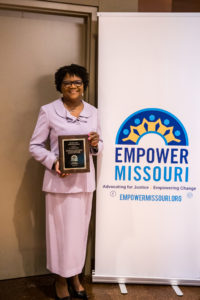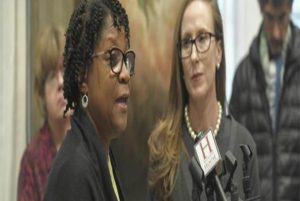
July 29, 2021: Missouri recently modernized the state’s HIV exposure laws–an effort that took over 10 years on the part of local advocates, legislators and other stakeholders. PWN Board Co-Chair LaTrischa Miles began her organizing efforts to reform Missouri’s HIV criminalization laws in 2011. PWN recently had the opportunity to interview her about her role in the HIV reform efforts and her legacy as an organizer.
Q. You began organizing to repeal or modernize Missouri HIV laws in 2011 when you learned that people living with HIV could face prison time. As a woman with HIV, how did you make the decision to be a public figure in the HIV movement during such misunderstanding about HIV? Tell us about your experience educating law enforcement in the early days of your organizing?
A. Change happens when people call out injustices, violations of the basic rights of others. These laws were violating people’s fundamental rights. It was extremely difficult educating law enforcement about HIV transmission. We gained headway with prosecutors who now understand how unjust these laws were to people living with HIV. Some prosecutors testified that their hands were tied in enforcing the laws because they did not recognize the science behind HIV. With regard to the police and other members of law enforcement, it remains a challenge educating them that saliva, urine, nor feces–though no one wants these bodily secretions thrown at them–actually transmit HIV. Our bill champion Rep. Phil Christofanelli spoke to them at length one-on-one and gave assurances that modernizing the law didn’t change their position. So today, we still have this sentence enhancement as far as law enforcement is concerned, but science is also recognized in the modernization of Missouri’s HIV law.
Q. You mobilized your community to discuss HIV criminalization when you learned that it was a real threat to the lives of people living with HIV. Can you tell us what you learned from those conversations? How did that knowledge fuel your passion to decriminalize HIV in Missouri?
A. From those conversations, I learned that people were stigmatized and suffering because of these unjust laws. Basically–if I’m an immigrant and being abused it’s his word against mine and most likely I don’t come forth to confront my abuser for few of deportation and imprisonment. Also, I am a runner–so should I be afraid to spit while running a 5-k or half-marathon since exposure and biting are still on the books as a way of transmission? Partners were wanting to put things in writing for fear of their significant others getting angry and turning them, in even though they knew the person was positive – fear-based relationships.
Q. Please share your experience organizing with the Missouri HIV Justice Coalition? What role did you play in modernizing Missouri’s HIV laws?
 A. I founded the coalition in December 2011. I had a meeting at our public library with 41 people in attendance. Everyone at the meeting was shocked in learning about the HIV transmission statute on the law book. Still no one wanted to step up and advocate to change the law except Diane Burkholder and myself. I asked if she would help me get the word out to the community members who were not at the meeting. We developed a PowerPoint presentation and presented to anyone who would listen. We found our audiences to include the sex crime unit, prosecutors, planning councils, and most importantly, the HIV community.
A. I founded the coalition in December 2011. I had a meeting at our public library with 41 people in attendance. Everyone at the meeting was shocked in learning about the HIV transmission statute on the law book. Still no one wanted to step up and advocate to change the law except Diane Burkholder and myself. I asked if she would help me get the word out to the community members who were not at the meeting. We developed a PowerPoint presentation and presented to anyone who would listen. We found our audiences to include the sex crime unit, prosecutors, planning councils, and most importantly, the HIV community. We gave these presentations frequently until our communications liaison helped to bring other areas in Missouri together. A year and a half later, our funding dried up, but not before connecting with eight other like-minded individuals interested in modernizing the HIV law. I met Sean Strub at SERO some years later and begged for help and along came Empower Missouri – Jeanette Mott Oxford (JMO) who knew MO legislature like to back of zir hand and that’s who we needed. Zie could walk into the capitol and they knew zir name. I did not have that kind of power, but zie helped teach me about advocacy days and I began visiting and testifying (I’ve done that 3 times). We went from 2 to 8 and now over 25 persons on the MO HIV Justice Coalition.
Q. In 2008, you were joined by 27 diverse women and founded PWN. What impacted you the most about that gathering?
A. What impacted me the most was the diversity of the women in regards to age, ethnicity, and work in their local communities. I was in awe of their vocal and steadfast commitment to women’s reproductive health, ending violence against women, and economic advancement of women living with HIV in poverty who were reliant upon Ryan White services. We came together out of need to address women’s issues and discussed how to get there. We knew that organizing among women living with HIV and our allies was the structure we needed to have a seat at the table.
Q. You currently sit as the PWN board chair. How has this position shaped your advocacy?
A. I see things now from a national standpoint through my position as PWN board co-chair. My perspective has expanded from thinking locally or regionally to advocating for changes that impact people living with HIV on a national scale. One thing that is a topic of concern for people living with HIV is molecular HIV surveillance.



